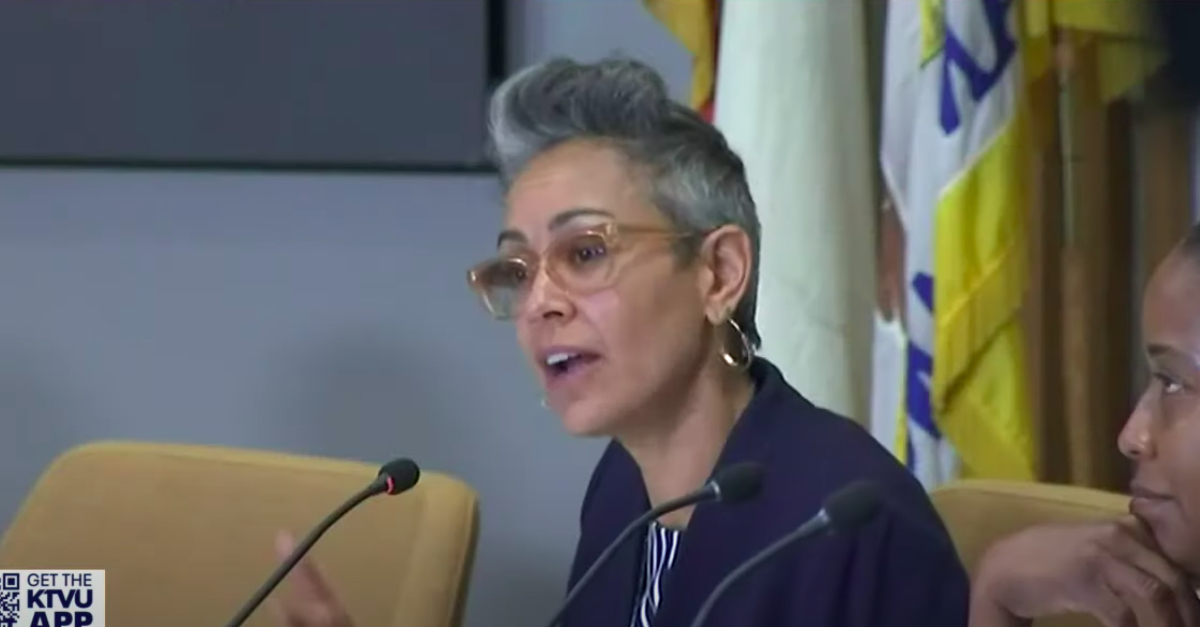
A federal judge on Monday dismissed a lawsuit filed by a member of the San Francisco Unified School District (SFUSD) who was demoted for Twitter posts likening Asian Americans to white supremacists.
Alison Collins was removed as Vice-President and from membership on all committees by a 5-2 vote in March after tweets from 2016 surfaced in which she criticized what she perceived as the Asian community’s reticence to criticize then-president Donald Trump.
A Black woman, Collins mused that “many Asian American[s] believe they benefit from the ‘model minority’ BS” and accused them of using “white supremacist thinking to assimilate and get ahead.”
The race-themed criticism went even further–relying on a mixed metaphor using both antebellum and more modern references: “Do they think they won’t be deported? profiled? beaten? Being a house n****r is still being a n****r. You’re still considered ‘the help.’”
The school board tried to force her resignation but Collins refused; instead she was stripped of her leadership position and committee assignments. In early April, she sued on First Amendment grounds. Collins also alleged 14th Amendment violations based on deprivations of liberty and property as well as numerous state tort claims.
The SFUSD and the five board members who voted against her were named as defendants in the lawsuit. Both the government agency and the members themselves filed motions to dismiss raising the defenses of 11th Amendment immunity and qualified immunity.
“[T]he Ninth Circuit has long held that school districts in California are considered state agencies entitled to 11th Amendment immunity,” the court noted. “Further, the district courts in this district have previously held that SFUSD is a state actor entitled to qualified immunity.”
Taking each set of defendants in turn, U.S. District Judge Haywood S. Gilliam Jr. found that Collins had failed to plead a case that was likely to win on the merits–denying her request for a preliminary injunction and dismissing the lawsuit entirely.
In her filings, Collins’s attorneys fatally failed to contest the school district’s immunity from suit under the 11th Amendment.
“Given this clear precedent and [Collins’s] lack of opposing arguments, the Court also finds that the inadequacy of [Collins’s] claims against SFUSD cannot be cured by allegations of other facts,” the court concluded regarding the school district. “Accordingly, the motion to dismiss all claims against SFUSD is granted without leave to amend. SFUSD is also dismissed as a defendant to this suit.”
Her effort against the five school board members in their official capacities didn’t fare any better.
In defending her First Amendment claim, Collins alleged an ongoing violation of federal law by state officers–which is the necessary response under relevant case law to claims of 11th Amendment immunity. The court, however, found her arguments lacking.
From the opinion:
While Plaintiff certainly seeks prospective relief in the form of a preliminary injunction to reinstate her as Vice President, the Court is unable to find in her complaint an adequate allegation of an “ongoing violation of federal law,” much less an alleged “practice, policy, or procedure” of Defendants that “animates the constitution violation at issue.”
Plaintiff argues that the individual Defendants “personally participated in the deprivation of [her] rights” under section 1983 and cites to allegations of the specific actions she says Defendants committed against her. But she does not identify an ongoing violation of federal law, as opposed to alleging a past violation of federal law caused by discrete past actions. Nor does she identify “a practice, policy, or procedure that animates the constitutional violation at issue.”
Collins invoked the First Amendment to claim that the school district members’ resolution demoting her “was, and still is, abridging the freedom of speech.”
Gilliam dismissed this idea out of hand.
“[N]owhere in her complaint does [Collins] allege facts supporting this legal conclusion,” the judge opined. “And [Collins] does not explain in her opposition how the resolution that removed her from her position as Vice President constitutes an ongoing violation of federal law.”
Collins also sued her enemies in their individual capacities–but the court found that those claims were barred by qualified immunity.
In another First Amendment claim, Collins said she was retaliated against for speaking out on matters of public concern.
In response, the five defendants said their actions were simply customary in the political arena where First Amendment jurisprudence is much more hands off. The court agreed–likening the situation to a similar case from 2010 where a school board member was removed from his vice president role for criticizing a contract renewal.
That prior case also unfolded in the Ninth Circuit which means the court relied on it both for its First Amendment analysis and to assert that the qualified immunity doctrine doesn’t recognize “a clearly established right” in line with the facts at issue here.
Again the court at length:
The Blair court relied on three factors distinguishing the case from a typical First Amendment retaliation case: (1) the adverse action taken against the plaintiff was “a rather minor indignity, and de minimis deprivation of benefits and privileges;” (2) “more is fair in electoral politics than in other contexts;” and (3) the board members were also entitled to “a protected interest in speaking out and voting their conscience on the important issues they confront.” The court concluded that these factors taken together showed that the school board’s action to remove plaintiff as vice president “did not amount to retaliation in violation of the First Amendment.”
While a decided defeat, Collins will have the opportunity to amend her complaint with different legal analysis and refile against the individual school board members. She will not be allowed to sue the school district itself over the same claims again.
Read the full opinion and order below:
[image via screengrab/KTVU]